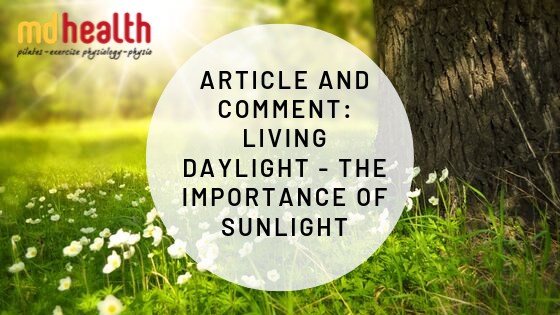Our change in lifestyle, from before the early 20th Century to modern times has meant we spend 90% of our lives indoors in artificial light and less time outdoors in sunlight.
This means that we are exposed to the opposite of the sun’s natural rhythm, resulting with more exposure to fluorescent light at night and less sunlight and natural light during the day.
But what does this mean and how important is sunlight?
This article discusses three important ways less sunlight affects our lives:
- Reduced exposure to sunlight (in particular the UV-B rays) reduced our natural production of vitamin D and affects our immune system.
- Exposure of the light responsive cells at the back of the eyes, called Intrinsically Photosensitive Retinal Ganglion Cells (ipRGC’s). These are sensitive to the blue light spectrum, including lights from LED’s and screens stimulates alertness directly in the brain (suprachiasmatic nucleus, the brain’s master clock). This means, watching screens at night “to get to sleep” actually keeps you awake and alert for longer. Even though you have to get up at the same time at night, resulting in a shorter sleep.
- Light at night time also reduces the release of melatonin. Melatonin is the hormone that re-enforces the circadian rhythm in humans, and with less of this you wake up feeling more tired and less refreshed from sleep.
What can you do to get more sunlight without disrupting your real life pressures?
- Small exposures to sunlight during the day can improve sleep and mood. So, go outside into the sunlight during your lunch break at work, walk to work or try to take a walk outside after work during the daylight to reap the benefits.
- Sleep in darkness. This is important for re-enforcing the circadian rhythm and improving your production of melatonin.
Sleep is so important for recovery and to get the best benefits for your Clinical Exercise or Tailored Strength and Fitness program at MD Health. Your muscles grow and heal when you rest and sleep, not when you exercise, so rest and sleep are very important parts of your overall exercise program.
Want to know more?
If you want more information regarding this article or would like to book for a FREE full body assessment with one of our Physiotherapists or Exercise Physiologists, call us on 03 9857 0644 or email us at admin@mdhealth.com.au



